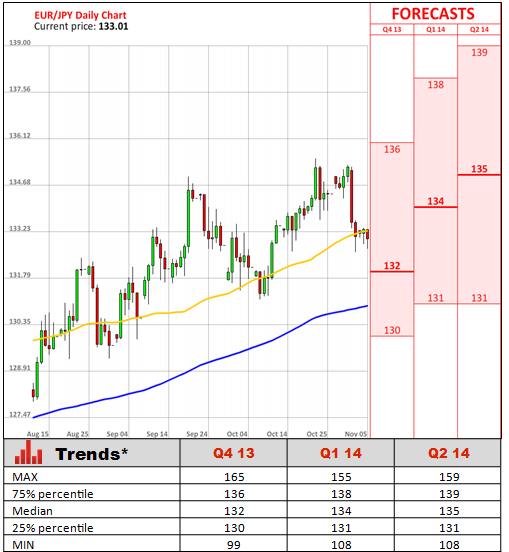Note: This section contains information in English only.

Tue, 05 Nov 2013 07:07:02 GMT
Source: Dukascopy Bank SA
"The BOJ will continue with quantitative and qualitative easing, aiming to achieve the price stability target of 2 percent, as long as it is necessary for maintaining this in a stable manner"
- Haruhiko Kuroda, Bank of Japan Governor
Abenomics are working. This is the statement made by the IMF last week, also saying there is still room to increase BoJ's purchase of government bonds and exchange-traded funds in case another boost is required. Domestic policymakers also backed current measures, considering them as effective tool to boost growth and inflation. With more and more analysts sharing a sympathetic view of Shinzo Abe's effort to reflate Japan's economy, there is still no room for complacency. An attempt to push the inflation in the economy with ageing population and do not have any avenue to increase their income is fraught with high risks. Though stimulus can reduce the real value of enormous government debt, Japanese households, which are the main owners of public debt, would be hurt- directly or indirectly, through their pension funds. In case Abe will not try to increase wages, and a rise would not offset inflation, the ageing population would be hurt.
Meanwhile, with a pickup in working hours, due to the stronger manufacturing, average monthly cash earnings fell 0.5% from August 2012. While too weak Yen would stoke tensions with China and the rest of Asia in general, Abenomics has proved to began to work. Moreover, the increased supply of Yen would lead to shrinking ECB balance sheets. Hence, Abenomics will alter the geopolitical and regional balance substantially, as well as can lead to more aggressive behaviour towards most of Japan neighbours.
© Dukascopy Bank SA
Actual Topics
Subscribe to "Fundamental Analysis" feed
Subscribe
Aby dowiedzieć się więcej o handlu Forex/CFD na platformie Dukascopy Banku, rynku SWFX oraz innych rzeczy związanych z handlem,
zadzwoń do nas lub poproś o oddzwonienie.
zadzwoń do nas lub poproś o oddzwonienie.
For further information regarding potential cooperation,
please call us or make callback request.
please call us or make callback request.
Aby dowiedzieć się więcej o Opcjach Binarnych w Banku Dukascopy / platformach handlowych Forex, SWFX, oraz innych,
zadzwoń do nas lub pozostaw prośbę o oddzwonienie.
zadzwoń do nas lub pozostaw prośbę o oddzwonienie.
Aby dowiedzieć się więcej o handlu Forex/CFD na platformie Dukascopy Banku, rynku SWFX oraz innych rzeczy związanych z handlem,
zadzwoń do nas lub poproś o oddzwonienie.
zadzwoń do nas lub poproś o oddzwonienie.
To learn more about Crypto Trading / CFD / Forex trading platform, SWFX and other trading related information,
please call us or make callback request.
please call us or make callback request.
To learn more about Business Introducer and other trading related information,
please call us or make callback request.
please call us or make callback request.
For further information regarding potential cooperation,
please call us or make callback request.
please call us or make callback request.